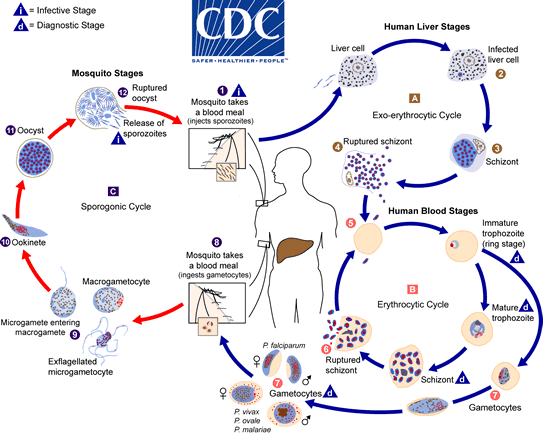
The CDC has reported that at least eight malaria infections in Florida and Texas have been detected during the past two months. These cases represent the first time locally acquired mosquito-borne malaria has occurred in this country since 2003.
Malaria is a serious and sometimes fatal disease marked by high fevers, shaking chills, and flu-like illness. It is caused by a parasite, Plasmodium, that commonly infects a certain species of mosquito that can then transmit the organism to humans when it bites them. The life cycle of its infection of humans, depicted below, is exceedingly complex.

Courtesy CDC.
About 2,000 cases of malaria are diagnosed in the United States each year, almost all in travelers and immigrants returning from countries where malaria transmission occurs, mostly sub-Saharan Africa and South Asia. Between the eradication of malaria in the U.S. in 1970 and the cases in Florida in 2003, the CDC reported 11 outbreaks involving only 20 instances of what was thought to be locally acquired mosquito-transmitted malaria.
Worldwide, however, malaria is a huge burden. The World Health Organization estimates that in 2020, 241 million clinical cases of malaria occurred, with 627,000 deaths, most of them children in Africa.
Lately, it seems that any infectious disease outbreak brings the conspiracy-theory crazies out of the woodwork, and this one is no exception. “So let me get this straight,” one person tweeted. “Bill Gates has been releasing GMO mosquitoes in Florida and Texas, and now Florida and Texas, for the first time in 20 years, have mosquitoes that give people malaria??? Is that right?”
Another tweeted: “It must be a coincidence that from 2003-2023 there wasn’t one case of Malaria spread by mosquitos … and along comes a company funded by Bill Gates … to solve a problem that didn’t exist … and suddenly in the exact places where he releases mosquitos … there’s an outbreak of Malaria?”
The Gates Foundation did give a grant to Oxitec, a British company that has developed genetically engineered mosquitoes to control mosquitoes that cause certain viral diseases, including Zika, dengue fever, chikungunya, West Nile, and yellow fever — but not malaria. These mosquitoes were released in California and Florida's Monroe County, but not Sarasota County or Texas, where malaria was contracted. Further, the Oxitec mosquitoes are the species Aedes aegypti, while the ones that transmit malaria are Anopheles. Also, the Oxitec mosquitoes are males, which don’t bite. (They reduce Aedes aegypti populations by passing a lethal mutation to their offspring.)
To be clear, Oxitec’s mosquitoes were not released where malaria was caught, are not of the species that transmit malaria, and are not even of the sex (female) that bites humans.
Researchers at Imperial College London have engineered mosquitoes that slow the growth of malaria-causing parasites in their guts and prevent transmission of the disease to humans. The mosquitoes carry a genetic modification that causes them, after a blood meal, to produce two antimicrobial peptides in the gut that inhibit the malaria parasite’s development. In a lab setting, the strategy works well to reduce the possibility of malaria spreading, but to my knowledge, there have not yet been any field trials of those mosquitoes, and certainly not in the U.S.
The Gates Foundation is also involved in this project, developing a model that can assess the impact of such modifications if used in various African settings. It predicts that the Imperial College approach could be a powerful tool for reducing the number of cases of malaria even where transmission is high. There is no mention of genetically engineered mosquitoes in the Gates Foundation’s extensive discussion of its many malaria-related projects.
Disease-carrying mosquitoes do not observe national borders. They can enter the U.S. on ships and planes, as well as in cars and trucks. We don’t need nutty conspiracy theories to explain the presence of locally acquired malaria cases in the U.S.



